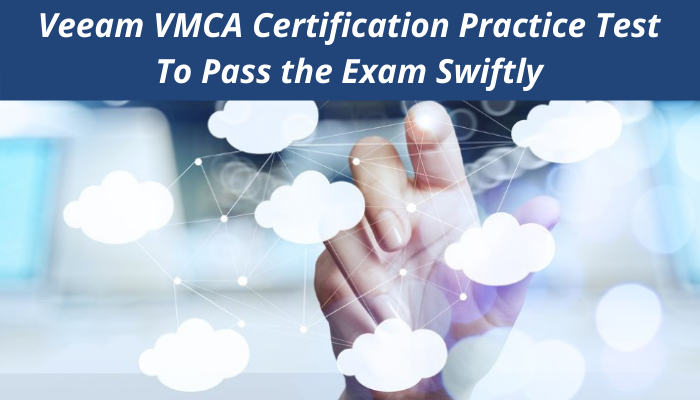If you are keen to work on Cloud Data Management, the VMCA certification could lead you there. Studying hard and using the VMCA practice test helps you reach The VMCA certification within a short span.
The VMCA is the highest level of Veeam certification and proves that an individual has a high level of technical and business skills to design complex, enterprise-level Veeam deployments.
With company databases growing in size and multiple people trying to access the data from numerous locations, managing that data has become an increasingly challenging task. Now data managers need a versatile system to meet all of their employee access needs while still guaranteeing data security. Many companies are finding solutions to these data difficulties using the cloud.
But using the cloud to solve multifaceted business problems needs understanding cloud data management, staying up-to-date on best practices, and learning from other successful organizations.
How to Get The VMCA Certification?
A candidate needs to pass two exams to earn the VMCA certification. Getting the VMCA certification needs an existing VMCE, Veeam Certified Engineer certification and completing the VMCE-ADO, Veeam Certified Engineer – Advanced: Design & Optimization training and exam.
VMCA offers VMware solution users, ESXi host certificates, and machine certificates for machines on which services are running. Host provisioning occurs when the ESXi host is added to the vCenter Server explicitly or as part of the ESXi host installation.
What Knowledge Is Useful to Become A VMCA?
A candidate can become VMCA certified easily if he has solid virtualization, recovery, and backup knowledge base.
What Should You Expect from the VMCA Exam?
The VMCA exam is a multiple-choice type exam and asks 40 questions. You get one hour to take the VMCA exam and should score a 70% mark to pass it.
VMCA Syllabus Topics:
The VMCA exam deals with topics like-
- Troubleshooting
- Audit and Compliance
- Automation
- Optimizations
- Security
- Infrastructure Assessment
- Design and Sizing
- Introduction
How Should You Study for the VMCA Exam?
Earn Complete Knowledge from the VMCA Syllabus:
Making it a priority to cover all syllabus topics could become conflicting and difficult for many aspirants. But if a candidate does it with solid planning and by making a study schedule, the exam preparation becomes more manageable. Go through the VMCA syllabus topics and schedule a plan to cover them all from the core. Set a target of covering at least two to three topics daily and try to do it without fail. As more knowledge about the syllabus helps a candidate attempt more questions in the exam, learning the syllabus and writing important notes is essential.
Join the Training to Level up Your Knowledge:
The Veeam Backup & Replication v11: Architecture and Design training session training is two days long and focuses on teaching IT professionals about efficiently architecting a Veeam solution through joining technical improvement. They need to follow the Veeam Architecture Methodology, which Veeam’s own Solution Architects use for their benefit.
During the training period, candidates will discover the goals of infrastructure assessment and requirement gathering that use the information to design Veeam solutions within team exercises. Candidates will analyze considerations when turning logical designs into physical designs and share the obligations to the implementation team that will activate the design.
The training also teaches about governance, security, and validation impacts while architecting a Veeam solution and building these into the overall product.
How Important Are VMCA Practice Tests?
VMCA practice tests are very helpful, and they help you to analyze your preparation level. The VMCA practice test is designed by experts and helps a candidate get valuable insights into his strengths and weaknesses. Therefore, keep practicing and level up your preparation. Don’t ignore the guidance you get through the practice test results. Follow the guidance and work on sections you can’t answer during your exam attempts.
What is cloud data management?
Cloud data management is a method to manage data across cloud platforms, either with or instead of on-premises storage. The cloud is helpful as a data storage tier for disaster recovery, backup, and long-term archiving.
Benefits of Cloud Data Management:
Here are some benefits of using data cloud management-
- Cloud data management allows organizations to store their data off-premise, usually via another vendor that is allotted to cloud data hosting. By this method, organizations can get their information from anywhere at any time but arranged in one place.
- The flexibility with cloud management is evident. In particular, the capabilities of public cloud computing have made the overnight shift to work from a remote place easier.
- Cloud also helps businesses to take benefits of automated backups and heightened data security. It may seem counter-intuitive that sending your data off-premise is safer than having it within your corporate firewall; however, modern cloud data solutions employ more advanced cloud security measures.
Bottom Line:
Earning a certification empowers you with the knowledge or particular technology and helps apply them in work efficiently. Therefore grab the VMCA certification to use the Veeam solution with ease, and earn career benefits.






